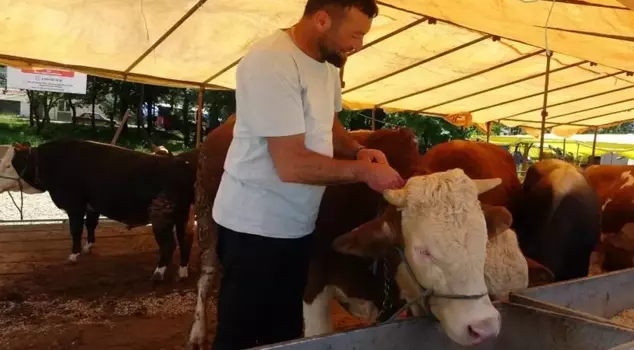
02.07.2025 14:25
Due to the foot-and-mouth disease outbreak in Turkey, all animal sales locations have been closed until further notice. Speaking about the outbreak for which a vaccination study is being conducted, Minister of Agriculture and Forestry İbrahim Yumaklı stated, "There is no risk in the consumption of red meat, and it can be consumed safely."
The Minister of Agriculture and Forestry, Yumaklı, stated in his remarks regarding foot-and-mouth disease that the ministry continues to carry out constant and meticulous monitoring activities across the country as part of the fight against all diseases threatening animal health. He said, "As a result of the vaccines we have developed against the existing serotype of this disease, intensive vaccination campaigns, and the measures we have taken, there has been an 80% decrease in the disease rate in 2024 compared to the previous year. New applications regarding animal movements have also been implemented before and during the Eid al-Adha."
VACCINATION ACTIVITIES HAVE BEEN INTENSIFIED
Yumaklı reported that a new serotype of foot-and-mouth disease (SAT1) has recently been detected, stating, "An effective vaccine against this serotype has been rapidly developed by the relevant units of our ministry and has begun to be applied in the field. Due to the increased animal movements after Eid al-Adha, an increase in the disease foci of the new serotype SAT1 has been observed. In response, our ministry has intensified vaccination activities."
"ANIMAL MOVEMENT HAS BEEN STOPPED TO PREVENT SPREADING"
Yumaklı expressed that vaccination alone is not sufficient in the fight against the disease, stating, "One of the most effective methods to prevent the spread of the disease is the cessation of animal movements, which is a standard measure frequently employed worldwide in the fight against animal diseases. Scientific evaluations indicate that the risk of transmission through direct contact with animals at sales locations is quite high. Additionally, indirect contacts through breeders, brokers, and animal traders, as well as village visits made for animal trade, can lead to the rapid spread of the disease to different regions. Therefore, the restrictions on animal movements applied in disease foci are of great importance not only for local but also for national animal health. The aim of all the measures taken is to protect animal health and to stop the spread of the disease as soon as possible."
"ANIMAL SALES PLACES HAVE BEEN TEMPORARILY CLOSED"
Minister Yumaklı provided the following information regarding the measures taken:
"To prevent the spread of foot-and-mouth disease and to ensure effective control, the activities of all animal sales places, including animal markets, live animal exchanges, animal collection and sales centers, as well as parks and fairs where animals are sold, have been temporarily suspended. This decision has been made solely to accelerate the control of the disease and is a temporary and preventive animal health measure. Vaccination efforts are continuing rapidly, and the measures taken following the vaccination of our entire animal population will be gradually lifted as the disease situation is monitored."
"WE ARE CLOSELY MONITORING THE PROCESS AS A MINISTRY"
Yumaklı emphasized that the measures taken do not threaten the country's food supply security in any way, stating:
"There is no expectation of any disruption in the supply of animal food, especially meat and dairy products. Our current stocks and production infrastructure are sufficient to meet this process. As the Ministry of Agriculture and Forestry, we are closely monitoring the process in all its details, and our veterinary health personnel and field teams are on duty 24/7. We are determined to eliminate threats to animal health and public health in cooperation with all our stakeholders."
"THERE IS NO RISK IN RED MEAT CONSUMPTION"
Yumaklı stated that foot-and-mouth disease does not transmit to humans, saying, "There is no risk in red meat consumption, and it can be consumed safely. During this process, we kindly ask our citizens to pay attention to the information and guidance provided by official authorities. We thank all our producers and citizens for their sensitivity and cooperation regarding our country's livestock."
WHAT IS FOOT-AND-MOUTH DISEASE?
Foot-and-mouth disease (FMD) is a highly contagious viral disease affecting cloven-hoofed animals. The causative agent is a virus called "Aphthovirus." It is most commonly seen in cattle, sheep, goats, and pigs. The disease manifests in animals with high fever, sores in the mouth, and lesions between the hooves and on the udders. Although foot-and-mouth disease does not cause death, it poses a significant economic risk due to serious declines in milk production, weight loss, and restrictions in animal trade.
HOW DOES FOOT-AND-MOUTH DISEASE SPREAD?
Foot-and-mouth disease can spread very quickly through direct contact between animals or indirectly. The transmission routes are as follows:
- Contact with the saliva, milk, feces, or nasal discharge of infected animals
- Use of contaminated feed, water, or equipment
- Transmission of the virus by humans through their hands, clothing, or vehicles
- Transported over long distances by the air (especially in windy conditions)
The virus is quite resistant in the external environment. This makes controlling the disease difficult and increases the rate of spread.
CAN FOOT-AND-MOUTH DISEASE TRANSMIT TO HUMANS?
The likelihood of foot-and-mouth disease transmitting to humans is very low. In very rare cases, mild symptoms may be observed in individuals who have had close contact with infected animals. However, these cases are quite limited. When seen in humans, it is usually limited to mild fever, sores in the mouth, and skin redness. Foot-and-mouth disease does not cause serious health problems in humans and generally resolves on its own.
WHAT SHOULD BE DONE TO PREVENT FOOT-AND-MOUTH DISEASE?
- Regular vaccination of animals
- Quarantine of suspicious animals
- Disinfection of barns and equipment
- Control of animal movements
- Compliance with hygiene rules by agricultural and livestock personnel